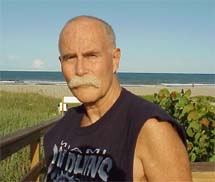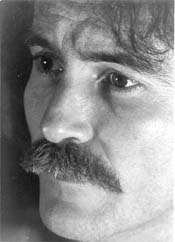|
By Jack Nichols
|
In 1977, two years following the publication of my book, Men's Liberation: A New Definition of Masculinity (Penguin Books, 1975, 1980), I took part in the deliberations of a small committee at the Men's Center in New York City. We were assigned the job of producing what was perhaps the American men's movement's first Statement of Purpose. The committee members relied on me to draft this statement which, with only minor modifications, they adopted, published and distributed at the Center. |

August 2001: Jack Nichols, GayToday's editor shown here on Cocoa Beach
where, in 1973, he began writing his major work, a philosophic criticism
of old-fashioned male roles. "A man can learn to bend like the willow,"
said the book's dedication to Lige Clarke.
|
The cover of the flyer asked: "What makes a man a real man?" This question was amplified on the flyer's inside panel: "Is it being tough hard and logical? Constantly
on top? A perpetual cocksman? Always a winner?"
The Statement of Purpose read:
Negative Effects of Conventional Male Role-Conditioning
|
The Men's Center of New York calls attention to conventional male roles and declares that they are destructive.
This is a necessary declaration because male roles are pushed by society on its sons with greater urgency and with wider effects than any other kind of conditioning.
Established institutions and their hierarchies use the values of conventional male roles to underwrite their positions.
The values transmitted by conventional male role-conditioning are-in this nuclear age-
among the most threatening social forces. Such values encourage the brutalization of life. |
 GayToday Editor Jack Nichols in 1975, when Publishers Weekly said of his book, 'Men's Liberation: A New Definition of Masculinity' (Penguin Books) that it "breaks new ground." GayToday Editor Jack Nichols in 1975, when Publishers Weekly said of his book, 'Men's Liberation: A New Definition of Masculinity' (Penguin Books) that it "breaks new ground." |
Adherence to the roles is largely responsible for the mental/spiritual segregation of the sexes. Such roles have fostered the value of domination of women, children, and other men, particularly if they have been seen in conventional male terms.
Some people are giving lip service to the concept of change while continuing to support traditional male roles, trying to assure their survival by camouflage. They practice
traditional masculinity on non-physical levels such as "proof" of male identity through intellectualized posturing and combat, political and technological domination, and narrow definitions of "reality" which reduce spirited life experiences to measurements and statistics.
Men who harbor such values are not likely to question imposed domination and aggression.
Benefits of Change
Men deserve to reclaim their spirited consciousness, long denied them because of male role conditioning.
To illuminate perceptions - in order to see and survive - men must give feelings a place equal with intellect.
Men who are developing a consciousness that puts them in touch with feeling experience
empathy, the avenue to encompassing awareness.
Removal of the conventional male role offers options better suited to personal and social survival.
We believe men can eliminate male role-conditioning that creates tensions and prevents men from having contact with their own feelings. We believe men can know the satisfactions of gender equality, compassion, cooperation, relaxation, calm, non-violence,
sensuality, playfulness, receptivity and intimacy.
A compassionate culture will flower as people liberate themselves in their persons and their institutions from conventional definitions of what it means to be a man.
This liberation points to a knowledge of human potential that bypasses those cynical dogmas which view humankind as innately programmed.
We who work for the liberation of people from conventional male roles welcome and support the advent of a new type of male, living with an evolutionary consciousness
suited to cooperation and survival of the world community.
What Can Be Done?
|
What can we do to foster the growth of new values and capacities among men? Individually and collectively we can work to develop:
Liaisons with groups working toward freedom from prescribed gender roles.
Non-competitive play and relaxation.
Physical health and bodily awareness without traditional rigidity.
Libraries, reading lists and speaker's bureaus.
Emphasis on roots in the men's liberation movement to provide historical continuity and philosophic perspective.
Liaisons with and educational programs for those institutions which affect popular consciousness, including religious denominations, government agencies, legislative bodies, newspapers, television stations, radio stations, schools, universities, professional guilds of librarians, social scientists, psychologists and psychiatrists.
|
Related Stories from the GayToday Archive:
Stiffed: The Betrayal of the American Man
What Makes a Man a Man?
Violence and Conventional Male Posing
Interview with Robert N. Minor, Ph.D.
Scared Straight
Mexico's Bare-Bottomed Revolutionaries
Machismo and the Marcolian
Masculinity in the Pages of Ms. Magazine
Related Sites:
Jack Nichols
GayToday does not endorse related sites.
|
Facilitation of consciousness-raising groups to eliminate the negative effects of conventional roles and to bring about the benefits of change.
Guidelines for consciousness-raising to foster individual and collective illumination and potential.
Groups of articulate men as media subjects (especially those who have chosen inner direction over social pressures in job selection, or those who have had positive experiences being supervised by women.)
Local level conferences publicized and operated for people who seek information about the men's liberation movement.
Groups for disseminating new perspectives on relationships and sexuality that are not colored by conventional gender-role expectations.
Groups for the encouragement of new perspectives on working, stressing usefulness to others, creativity, and pleasure without focus on money, power or status.
Groups focusing on political awareness emphasizing self-regulating non-hierarchical co-operative (non-competitive) values on local levels.
Maintenance of contact with local men's groups in the international network, exchanging information and supporting projects of mutual interest.
Ad hoc committees have been formed, including those for programs, conferences, publications, careers, and divorcing men. Other committees are forming.
|





 GayToday Editor Jack Nichols in 1975, when Publishers Weekly said of his book, 'Men's Liberation: A New Definition of Masculinity' (Penguin Books) that it "breaks new ground."
GayToday Editor Jack Nichols in 1975, when Publishers Weekly said of his book, 'Men's Liberation: A New Definition of Masculinity' (Penguin Books) that it "breaks new ground."